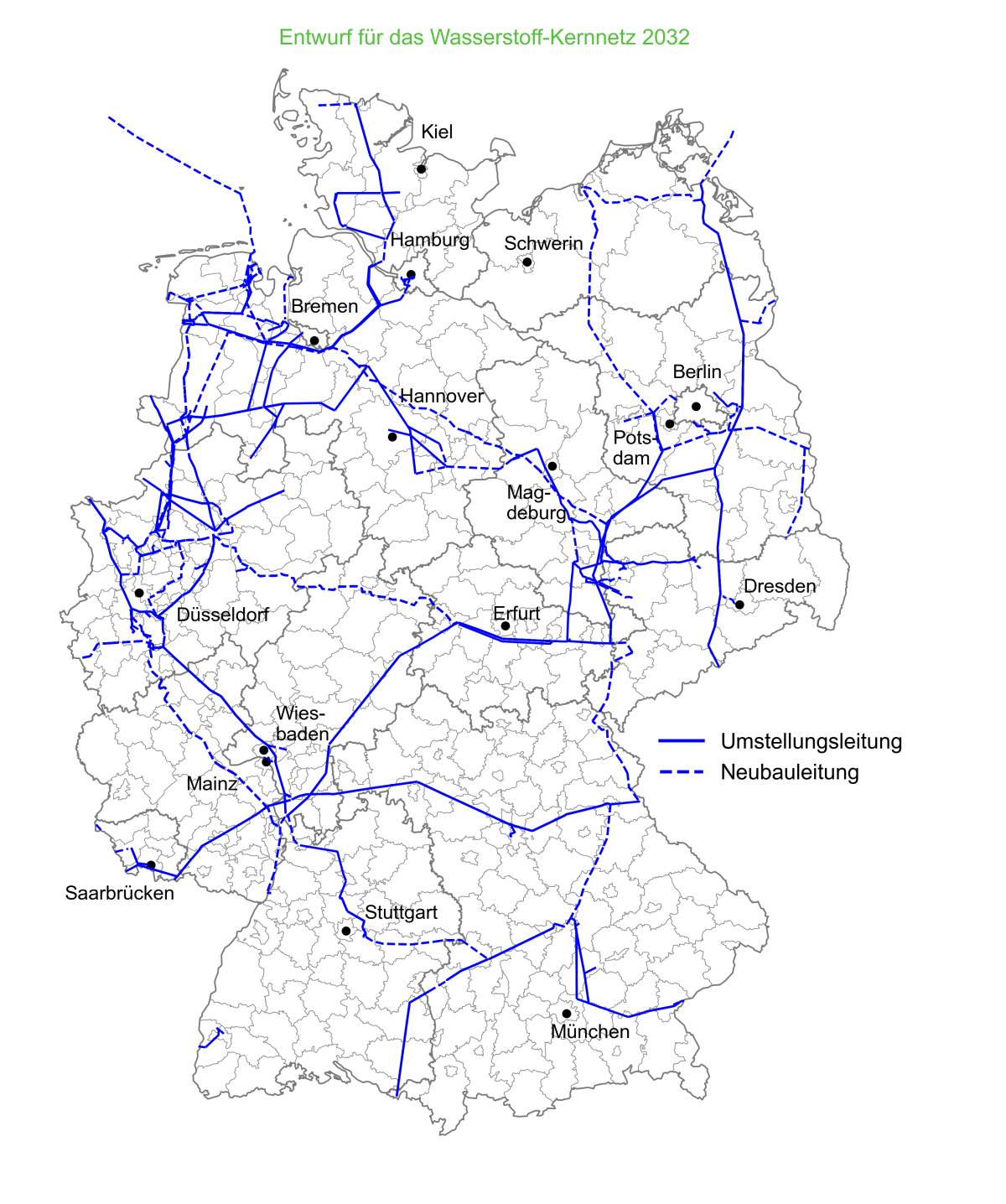German govt adopts import strategy for green hydrogen
The German government has adopted a strategy to import hydrogen and its derivates to strengthen the country's national hydrogen strategy and develop its domestic hydrogen market, according to a press release from the Ministry for Economy and Climate Protection (BMWK). The import strategy sets out a pathway to meet Germany’s predicted hydrogen demand, which the government assumes to reach 95 to 130 terawatt hours (TWh) by 2030 and rise in following years. Around 50 to 70 (45 to 90 TWh) percent of this forecasted demand will probably have to be imported, the BMWK expects.
The strategy identifies a list of hydrogen derivates, such as ammonia and methanol, to be considered. It also sets out a plan to expand the country’s fleet of import ships and pipelines, and to sign agreements with partner countries to encourage greater regional and international cooperation on hydrogen.
"In the medium to long term, a large part of Germany's hydrogen requirements will have to be covered by imports from abroad," economy minister Robert Habeck said. "The import strategy provides the framework for this. It sends a clear signal to our partners abroad: Germany expects a large and stable domestic demand for hydrogen and derivatives and is a reliable partner and target market for hydrogen products.”
Green and "low carbon" hydrogen allowed
Demand for hydrogen is largely to be driven by the steel industry, basic materials and petrochemicals, as well as mobility and logistics, and in the power plant sector. By 2045, the economy ministry expects demand to stand at 360 to 500 TWh for hydrogen and around 200 TWh for hydrogen derivatives. To enable the necessary rapid hydrogen market ramp-up, "low-carbon" blue hydrogen is included to meet demand.
Industrially produced hydrogen comes in a number of different ‘colours’, which correspond to the way it was produced. Green hydrogen is produced by using renewable electricity to split water molecules into their constituent oxygen and hydrogen atoms via electrolysis, which is considered the only truly climate-neutral form of hydrogen. Blue hydrogen is produced by breaking down fossil fuel-derived hydrocarbons into hydrogen atoms and using carbon capture and storage (CCS) for emissions released in the production process.
In July 2023, the German government adopted an update of its national hydrogen strategy, which aims primarily to increase energy efficiency and electricity use across the country, and integrate hydrogen-based energy into sectors where electrification is not an option, such as in parts of industrial manufacturing or in chemical production. The strategy defined a number of targets for the government to reach by 2030, including doubling the country’s green hydrogen production capacity from 5GW to 10GW, expanding its hydrogen infrastructure, and creating the conditions for a flourishing hydrogen market at home and abroad.
The newly agreed hydrogen import strategy is intended to supplement the national hydrogen strategy by outlining paths to meet demand by scaling up imports of hydrogen and its derivatives by 2030 and beyond. It sets the pathway for the development of both pipeline and ship transport import infrastructures, with transport by ship, rail or road particularly relevant for hydrogen derivates. Land-based LNG terminals should be constructed to be H2-ready as well. Germany hopes to diversify supply sources as broadly as possible with a number of partnerships with varying countries, regions and players.
Industry calls for speed and priorities, environmental groups concerned
The Association of German Engineers (VDI) welcomed the adoption of the import strategy, writing in a press release that it “sends important signals to industry and future partner countries,” but warning that the process must start “quickly and flexibly, as Germany is in competition with other [hydrogen] importing countries.” VDI emphasised Germany’s need to rapidly build up its hydrogen transport and storage network, its green hydrogen production capacity, and the need to develop a standardised certification system guarantee quality when working with partner countries.
Energy industry association BDEW also welcomed the strategy, especially the focus on both pipeline and ship imports. "In order to achieve the required volumes and the necessary speed, suitable import infrastructures, foreseeable long-term supply volumes, internationally compatible certification systems and a secure demand are needed," BDEW head Kerstin Andreae said. The association called for the prioritisation of measures and targets, which it said the strategy lacked.
Lobby group Zukunft Gas also called for clearer prioritisation: "Although the strategy states that hydrogen imports will be an important component of the future energy system, it gives no indication of a reliably growing demand in Germany," Zukunft Gas head Timm Kehler said. The group called for "a standardised, international certification system for hydrogen" to develop a global market.
However, the import strategy has also drawn criticism from the green campaign group Environmental Action Germany (DUH) for not focusing exclusively on the development of green hydrogen infrastructure and agreements. Sascha Müller-Kraenner, DUH’s director, said “without a clear commitment to sustainable green hydrogen and concrete approaches for its efficient use, the intended positive climate benefit will be negated.” In a press release, the group warned that over-reliance on hydrogen would increase Germany’s overall energy demand, making it harder to combat climate change in the long run. DUH called for a flat rejection of blue hydrogen and “a return to climate targets”.
Greenpeace also called the addition of blue hydrogen imports a wrong decision. "Anyone who wants to stop the climate crisis must not plan with hydrogen from natural gas," Greenpeace's Mira Jäger said. "Fossil fuels have no place in a sustainable energy system." The environmental group also said that imports should follow strict social and ecological criteria, and should only come from surplus renewable energy "so as not to slow down the energy transition in exporting countries". "The oversized import volumes that the German government is dreaming up here are not compatible with this," Jäger said.


